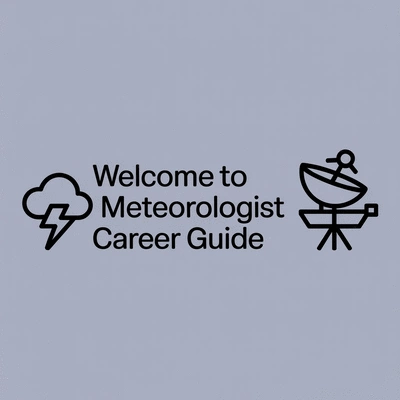What if the key to a successful meteorology career lies not just in understanding weather patterns but also in mastering the skills to communicate them effectively? As the field continues to evolve, so too must aspiring meteorologists equip themselves with essential competencies.
What You Will Learn
- The importance of both technical and soft skills in meteorology.
- Key competencies employers seek, including data analysis and communication.
- How to enhance your skill set through workshops, online courses, and networking.
- Strategies for engaging with the meteorology community to expand your professional network.
Key Skills for Aspiring Meteorologists
The competitive field of meteorology demands a blend of technical and soft skills. Below is an overview of the crucial competencies employers seek.
Technical Skills
- Data Analysis: Interpreting meteorological data.
- Software Proficiency: Using meteorological tools (Python, MATLAB, GIS, WRF).
- Climate Models: Understanding and applying climate models.
Soft Skills
- Communication: Conveying complex information clearly.
- Teamwork/Collaboration: Working with colleagues effectively.
- Adaptability: Navigating the unpredictable nature of forecasting.
Development Steps
- Courses/Workshops: Enhance technical skills.
- Networking: Connect with professionals (AMS, NWA).
- Community Engagement: Join clubs, forums, conferences.
Essential Resources
- AMS: Educational resources, certifications.
- LinkedIn Learning: Courses on data analysis, software.
- NWA: Professional development, networking.
Understanding the Essential Skills for Meteorology Careers
As an aspiring meteorologist, it’s vital to recognize how essential skills can shape your career trajectory. The skills you possess not only influence your ability to perform tasks effectively but also play a crucial role in hiring decisions made by potential employers. In a competitive field like meteorology, standing out means showcasing a blend of technical knowledge and soft skills!
When job seekers demonstrate a strong skill set, they increase their chances of landing interviews and job offers. I’ve seen it firsthand: employers are looking for candidates who not only understand weather patterns but also possess the ability to communicate these insights clearly and effectively.
Why Skills Matter in Meteorology
The field of meteorology is constantly evolving, and with it, the skills required to succeed are also changing. Employers prioritize candidates who not only have a foundational understanding of meteorological concepts but also the practical skills to apply that knowledge. This means being well-versed in data analysis, communication, and technology is crucial!
- Strong analytical skills for interpreting weather data
- Excellent communication abilities to convey complex information
- Technical proficiency in meteorological software and tools
Understanding the significance of these skills can help you focus your learning and development efforts. The combination of technical prowess and effective communication can lead to a successful and fulfilling career in meteorology.
Overview of Top Skills Employers Seek in Meteorologists
Before we dive deeper into the specific skills, it's important to highlight the key competencies that employers look for in meteorologists. A successful meteorologist often possesses a mixture of hard and soft skills that enhance their ability to perform in various roles. According to the U.S. Office of Personnel Management's qualification standards for meteorologists, these include a strong grasp of meteorological theory and practical application. Here’s a quick overview of those skills:
- Data Analysis: Essential for interpreting meteorological data and forecasting.
- Communication: Vital for reporting weather forecasts and engaging with the public.
- Technical Skills: Proficiency in using meteorological software and tools.
These skills not only help you excel in your studies but also prepare you for the challenges of the workplace. By honing these competencies, you can position yourself as a strong candidate in the job market.
Key Competencies in Atmospheric Science
In atmospheric science, the blend of technical skills and soft skills creates a well-rounded meteorologist. The World Meteorological Organization's (WMO) Basic Instructional Package for Meteorologists emphasizes the importance of both. Technical skills include data analysis and proficiency in various software tools, while soft skills encompass communication, teamwork, and adaptability. Both are essential for navigating the unpredictable nature of weather forecasting.
- Technical Skills: Understanding climate models and data analysis tools.
- Soft Skills: Collaborating with colleagues and translating complex data for broader audiences.
As you embark on your meteorological journey, remember that developing both sets of skills will be instrumental in your career advancement. Employers highly value individuals who can adapt, think critically, and communicate effectively!
Interactive Poll: Your Meteorology Journey
As you consider the essential skills for a career in meteorology, we want to hear from you! Which skill do you think is the most crucial for aspiring meteorologists to develop? Share your thoughts below:
Frequently Asked Questions About Meteorology Skills
What are the most important skills for an aspiring meteorologist?
Aspiring meteorologists need a blend of technical and soft skills. Key technical skills include data analysis, proficiency in meteorological software (like Python, MATLAB, GIS, WRF), and understanding climate models. Essential soft skills are communication, teamwork, and adaptability.
Why is communication important in meteorology?
Communication is crucial for meteorologists to convey complex weather information clearly and effectively to diverse audiences, including the public, emergency services, and other professionals. This ensures that forecasts and warnings are understood and acted upon.
How can I enhance my meteorological skills?
You can enhance your skills by enrolling in relevant online courses or workshops, attending local meteorology events, joining professional organizations like the AMS or NWA, and engaging with the meteorology community through forums and conferences. Gaining hands-on experience by volunteering for weather-related projects is also highly beneficial.
What software tools are important for meteorologists?
Important software tools for meteorologists include Python for data analysis and modeling, MATLAB for numerical analysis, GIS software for spatial data analysis and visualization, and weather simulation tools like WRF (Weather Research and Forecasting model) for forecasting and research.
What role do professional organizations play in a meteorologist's career?
Professional organizations like the American Meteorological Society (AMS) and the National Weather Association (NWA) provide valuable resources such as educational materials, certifications, professional development opportunities, and networking events. They help meteorologists stay updated on industry trends and connect with peers and experts.
Summarizing Key Takeaways for Aspiring Meteorologists
As we wrap up our discussion on the essential skills for a successful career in meteorology, it's important to remember that a solid foundation in both technical and soft skills is crucial. Skills like data analysis, effective communication, and adaptability will not only enhance your employability but also empower you to make a meaningful impact in the field. Aspiring meteorologists must recognize the blend of competencies required and actively seek out opportunities to develop them.
Whether you're embarking on your journey or considering a career change, reflecting on these skills is key. Are you ready to dive into the world of weather science? I encourage you to take this moment to assess your strengths and areas for growth!
Taking Action: Steps to Enhance Your Meteorology Skills
Once you've identified the skills you need, the next step is to actively pursue opportunities to enhance them. Whether you're a student or a career changer, your proactive approach is essential for success. Engaging in skill development and networking can open doors to exciting opportunities in meteorology. Here are some actionable steps you can take:
- Enroll in relevant online courses or workshops to boost your technical skills.
- Attend local meteorology events or webinars to connect with professionals in the field.
- Join relevant social media groups and platforms to stay updated on trends and advancements.
- Consider volunteering for projects related to weather science to gain hands-on experience.
Remember, the pursuit of knowledge and connections is a continuous journey. Each step you take brings you closer to your goal of becoming a skilled meteorologist!
Resources for Skill Development and Networking
To help you on your path, here are some valuable resources that can bolster your skill development and expand your professional network:
- American Meteorological Society (AMS): Provides educational resources, certifications, and networking opportunities. It's a great place to understand the academic requirements, as outlined in the AMS Statement on the Bachelor's Degree in Atmospheric Science.
- Meteorology.org.au: An Australian-centric platform offering information on meteorology education and events.
- LinkedIn Learning: Offers a variety of courses on meteorology, data analysis, and essential software tools.
- National Weather Association (NWA): A great resource for professional development and networking within the meteorology community.
Utilizing these resources can significantly enhance your skills and provide you with a robust network of support as you advance in your meteorology career.
Engaging with the Meteorology Community
Engagement with the meteorology community is vital for your growth and visibility in the field. Here are some ways you can actively participate:
- Join local meteorology clubs or organizations to meet like-minded individuals.
- Contribute to online forums and discussions related to weather science.
- Attend meteorological conferences to learn from experts and network with professionals.
- Follow industry leaders on social media to stay informed about developments and opportunities.
Being proactive in these communities not only enhances your learning but also positions you as an engaged member of the meteorology landscape. Who knows? You might meet a mentor or collaborator that could lead to exciting opportunities!
Utilizing Meteorological Software for Enhanced Learning
Another way to bolster your meteorology skills is by diving into meteorological software tools. Familiarizing yourself with the following can greatly enhance your learning and practical applications:
- Python: A versatile programming language widely used for data analysis and modeling.
- MATLAB: Useful for numerical analysis and algorithm development in meteorology.
- GIS Software: Geographic Information Systems are essential for spatial data analysis and visualization.
- Weather Simulation Tools: Software like WRF (Weather Research and Forecasting model) are invaluable for forecasting and research.
By integrating these tools into your study routines, you can gain hands-on experience that will set you apart in the job market. Ready to explore the dynamic world of meteorological software? Let’s get started on this exciting journey together!
Recap of Key Points
- A successful meteorologist should possess a blend of technical skills such as data analysis and proficiency in meteorological software.
- Effective communication is crucial for conveying complex weather information to diverse audiences.
- Engagement with the meteorology community through networking and participation in events can enhance career opportunities.
- Utilizing meteorological software tools like Python and GIS can significantly improve practical applications and learning.
- Continuous skill development through courses, workshops, and volunteer opportunities is essential for career advancement.









